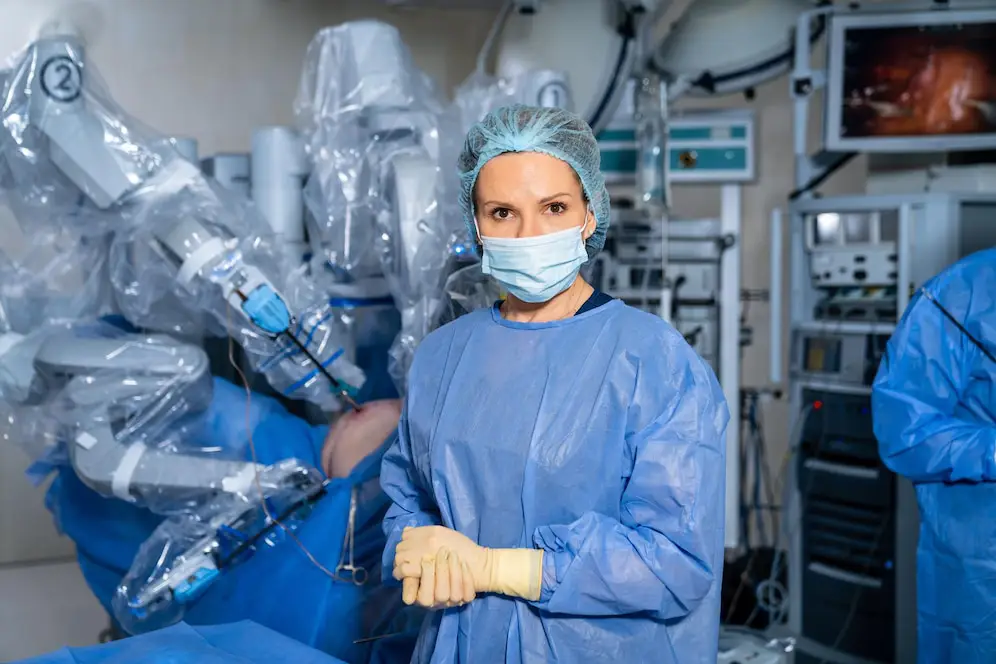Treatments
Laparoscopic Surgery

What is Robotic and Laparoscopic Surgery?
Robotic and laparoscopic surgery are advanced minimally invasive surgical techniques used to treat a wide range of colorectal conditions. These procedures involve small incisions, specialized instruments, and high-precision technology, allowing for quicker recovery, reduced pain, and minimal scarring compared to traditional open surgery.
Laparoscopic Surgery
Laparoscopic surgery, also known as keyhole surgery, involves making small incisions through which a camera and surgical instruments are inserted. The surgeon views a magnified image on a screen and performs the procedure with precision.
Robotic-Assisted Surgery
Robotic-assisted surgery enhances laparoscopic techniques by providing superior dexterity and precision. The surgeon operates robotic arms from a console, allowing for greater control, stability, and access to difficult-to-reach areas.
Symptoms
Symptoms That May Require Robotic and Laparoscopic Surgery
If you experience any of the following symptoms, a consultation with a specialist may be necessary
Persistent abdominal pain or bloating
Blood in stool or rectal bleeding
Unexplained weight loss
Chronic constipation or diarrhea
Hernia bulging or discomfort
Severe haemorrhoids causing pain or bleeding
If you experience any of these symptoms, it's important to consult a healthcare provider for further evaluation.
How We Can Treat
These techniques are commonly used to treat conditions such as
How is Robotic and Laparoscopic Surgery Used for Treatment?
- Colorectal Cancer – Precise removal of cancerous tissues with minimal impact on surrounding structures.
- Inflammatory Bowel Disease (IBD) – Surgery for Crohn’s disease and ulcerative colitis.
- Diverticulitis – Removal of affected portions of the colon to prevent complications.
- Hernias – Repair of inguinal and abdominal hernias.
- Haemorrhoids and Anal Fissures – Advanced surgical treatments for severe cases.
Benefits of Robotic and Laparoscopic Surgery
- Minimally Invasive – Smaller incisions mean less pain and faster recovery.
- Reduced Risk of Complications – Lower chance of infection and blood loss.
- Shorter Hospital Stay – Many procedures allow patients to return home sooner.
- Enhanced Precision – Robotic assistance offers better accuracy and control.
Book a Consultation for laparoscopic surgery in London
If you are considering robotic or laparoscopic surgery in London, Dr. Minicozzi offers expert, patient-centered care using the latest surgical techniques. Contact us today to schedule an appointment and discuss your treatment options.
FAQ
FAQs About Robotic and Laparoscopic Surgery
Is robotic surgery safer than traditional surgery?
Yes, robotic surgery provides enhanced precision, reducing the risk of complications. It also allows for smaller incisions, leading to a quicker recovery.
How long is the recovery time?
Recovery varies by procedure but is generally faster than open surgery. Most patients resume normal activities within a few weeks.
Will I experience pain after robotic or laparoscopic surgery?
Patients typically experience less pain compared to traditional surgery, and pain management options are available.
Is robotic surgery covered by insurance?
Coverage depends on your insurance provider and the specific procedure. It’s best to check with your insurer.
How do I know if I am a candidate for robotic or laparoscopic surgery?
A consultation with Dr. Minicozzi will help determine the best surgical approach for your condition.

